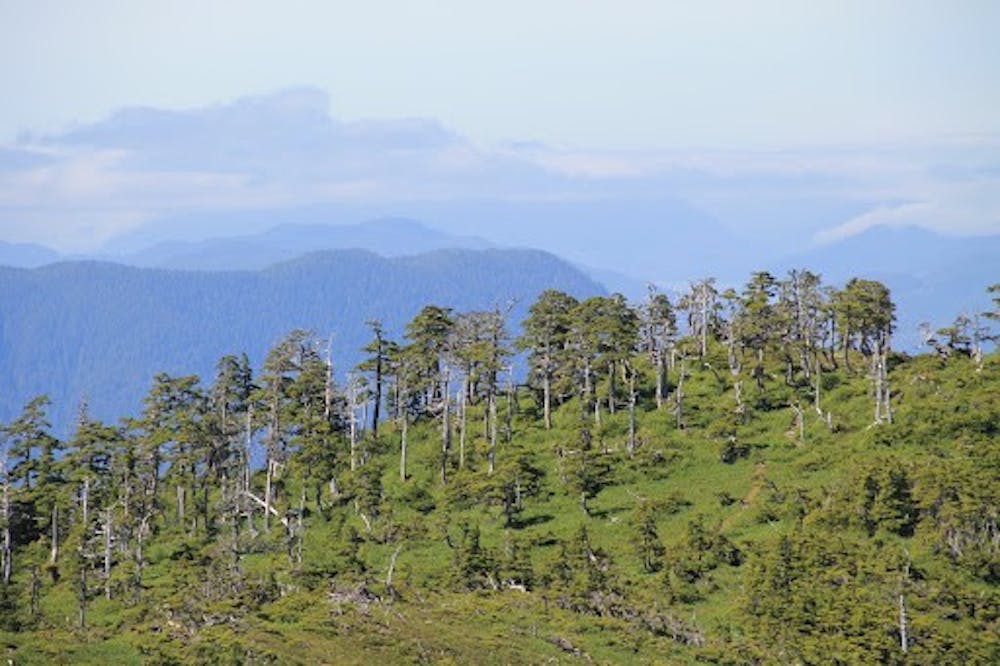My first column for the ‘Prince,’ written in the summer of 2020, detailed the importance of protecting the Tongass National Forest in Southeast Alaska. The Tongass acts not only as one of the world’s best carbon sinks, a place of economic potential through tourism and outdoor recreation, and an abundant source of wild foods, but has also been the traditional homelands of the Tlingit, Haida, and Tsimshian peoples for over 10,000 years. When I wrote the column, the Trump administration had proposed a rollback of the Roadless Rule, which protects over nine million acres of land in the Tongass, despite 96 percent of public commenters opposing the rollback of these protections.
This summer, I had the opportunity to work with Sitka Conservation Society on forest management policy. Being on the ground in the Tongass, I was able to witness the Biden administration’s efforts to restore protections to the forest and mitigate climate change firsthand.
In observing the merits and downfalls of Biden’s approach to forest and climate policy, I was reminded of a similar situation from much closer to home: the case for fossil fuel divestment.
When we consider the similar obstacles faced in both federal forest management and a student-run college divestment campaign, one can see that resilience in the face of the climate crisis is entirely attainable. The problem? The decision makers positioned to take action are privileged with wealth and power, and thus, a false sense of security as they dictate the future of our planet from the comfort of Washington D.C., where the impacts of climate change are not yet felt so severely as in Alaska.

The old growth of the Tongass near Sitka, AK
The Daily Princetonian / Hannah Reynolds
Some of the policies implemented by these decision makers are successful. This summer, for example, in addition to beginning a process to restore the Roadless Rule, the USDA announced plans for a holistic approach to their new Southeast Alaska Sustainability Strategy, beginning with a ban on old growth logging. At the same time, Sen. Lisa Murkowski (R-Ala.) was closely involved with Biden’s infrastructure bill, which offered the opportunity to electrify much of Southeast Alaska. These wins for the Tongass show just how possible it is to address the climate crisis with ambitious and decisive climate policies, with proper leadership from public officials.
Other federal land management efforts in the Tongass fell short, however, with partisan conflicts jeopardizing our best shot at addressing climate change. For one, the Forest Service’s metrics for success in the Tongass remain predominantly focused on timber sales and wildfire management, rather than clean energy and carbon sequestration. By continuing to focus their efforts on a dying (and mismanaged) industry, the Forest Service demonstrates a preference to “business as usual” over ambitious climate action. At the same time, the national infrastructure budget was cut from $2.25 trillion to $1.7 trillion as a result of partisan negotiations. This prioritization of party politics over an opportunity to advance the economic and ecological wellbeing of Americans demonstrates yet another failure of our public leaders to take climate action, despite being so well-equipped to do so.

Receding Mendenhall Glacier in Juneau, AK
The Daily Princetonian / Hannah Reynolds
Still, none of the forest management strategies employed by the Biden administration are ambitious enough to address the ever-present and escalating threat of climate change. Why? Those in positions of power — whether senators, presidents, or wealthy lobbyists — have the luxury of focusing on money because they feel there will always be ways to escape the existential threat posed by climate change.
The people with the power to do something about climate change are not our youngest generations with their entire lives ahead of them. They’re not the marginalized and low income populations often significantly more vulnerable to climate change. They’re not people living in coastal communities threatened by sea level rise and tropical storms, or in the West with drought and wildfires threatening their homes and communities, or in Arctic villages sinking into the ground due to thawing permafrost. These are people with the resources to keep sitting comfortably on Capitol Hill while the rest of us are fighting for our lives and our futures.
Here at Princeton, we see the same thing happening. Over 2,300 Princetonians have signed Divest Princeton’s Open Letter to the University, calling for urgent divestment and dissociation from the fossil fuel industry. Princeton’s response? An embarrassingly vague and unambitious plan to partially divest from an industry that has publicly spread climate disinformation and profited off of climate change for decades, only after decades of student organizing around the issue.

Photo of Divest Princeton rally
The Daily Princetonian / Hannah Reynolds

Since then, there have been no public updates on the progress on divestment and very minimal engagement between the divestment committee and student organizers. Similar to federal public officials, Princeton’s leaders continue to delay progress and fail to sufficiently address their culpability in the climate crisis. These leaders are privileged in their ability to concern themselves more with maintaining research funding from egregious polluters like ExxonMobil and BP than listening to the voices of students, alumni, and faculty whose futures are at stake.
What Princeton’s leadership fails to acknowledge is that their resistance to immediate climate action directly impacts the lives of its students and alumni all over the world. Many of us have already felt the impacts of climate change in our home communities. In fact, just last week, as we took shelter from a tornado and flash flooding in Princeton, Hurricane Ida caused mass devastation across the country and the deaths of over 80 Americans. What caused these destructive storms? None other than climate change, which Princeton remains complicit in so long as it continues to invest and partner with an industry that is actively destroying our futures.
Our leaders, whether USDA officials, or legislators, or Trustees at Princeton, must listen to those most affected. Our leaders must listen to those in frontline communities where severe and disproportionate impacts of climate change are already being felt. They must listen to Indigenous peoples who have lived upon and stewarded these lands for thousands of years. They must listen to the young people who lack the political power to take climate action, but will have to live with the consequences of corporate greed and irresponsibility. Our leaders must listen and take decisive action now.
We can’t afford to wait any longer. 2046 is too late.
Hannah Reynolds is a senior in the anthropology department from the Finger Lakes, N.Y. She is also the co-coordinator of Divest Princeton and works for Sitka Conservation Society on Tongass policy. She can be reached at hannahr@princeton.edu.








